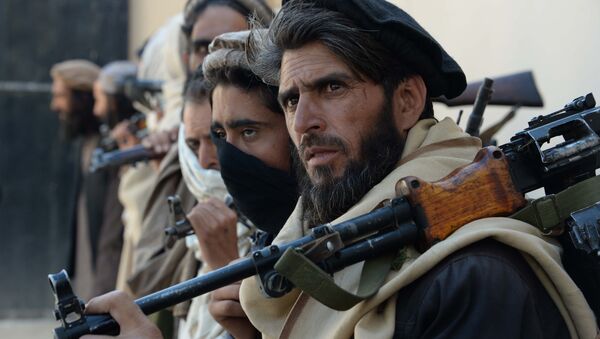WASHINGTON (Sputnik) – On Thursday, US media reported that the Obama administration would give US forces broader authority to advise conventional Afghan troops with missions the same way they have been assisting Afghan Special Forces personnel.
“The debacle is yet another nail in the coffin of the Rumsfeld Doctrine with its reliance on air supremacy, high-tech weaponry, and light and nimble ground forces,” foreign affairs expert and author Dan Lazare told Sputnik on Friday.
The Rumsfeld Doctrine was applied in Afghanistan in 2001 and in Iraq in 2003, but in both cases the US armed forces failed to send enough forces to ensure security in either country, opening the way for the Taliban, al-Qaeda, and Islamic State to launch formidable insurgencies, Lazare recalled.
“It was a very '90s doctrine in keeping with just-in-time inventories, labor flexibility, and creative finance,” he pointed out. “But war is a long hard slog, and light and nimble just doesn't do the trick.”
The move to increase US combat support for Afghan ground forces suggested that US military commanders were increasingly worried about the cohesion and survivability of the Afghan National Army, Lazare observed.
“I strongly suspect that the Afghan Army is crumbling. After all, the war is going poorly, and Taliban power and influence are on the upswing, so everyone knows that the Kabul regime's days are numbered,” he said.
Lazare also noted that US President Barack Obama approved the assassination of Taliban leader Mullah Mansour as a desperate move to try and force the Taliban to negotiate.
“The assassination of Mullah Mansur a couple of weeks ago struck me as a bit pathetic. Obama expressed the hope that it would somehow persuade the Taliban to join the Afghan government in a reconciliation process that leads to lasting peace and stability,” he recollected.
However, the assassination was more likely to backfire and make the Taliban more determined than ever, Lazare predicted.
The death of Mansour “just makes them more ornery and more determined to continue with their long war to drive the United States out. Time is definitely on their side,” he maintained.
Lazare dismissed the new US support policy as a minor measure almost certain to fail.
“It's just another half-hearted measure aimed at ratcheting up the pressure and making it look the US military is getting somewhere, when it's not. The long-term effect will be nil,” he summed up.
Middle East Institute Resident Scholar Marvin Weinbaum told Sputnik that the new US combat policy reflected a recognition that the US-supported Afghan national forces were on the defensive against the Taliban.
“The policy shift… reflects the reality that the ANDSF [Afghan National Defense and Security Forces] cannot at this time contain, much less roll back, Taliban military gains,” he warned.
Until the United States was prepared to order air strikes to be freely used to attack the Taliban in Baluchistan and throughout Afghanistan, there could be no substantial improvement in the security situation, Weinbaum concluded.
Earlier on Friday, White House spokesperson Josh Earnest emphasized that US forces would not be in a combat role and the US mission in Afghanistan has not changed despite Obama’s new change in policy.

